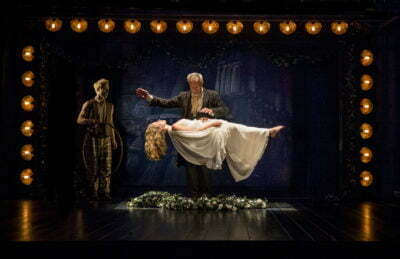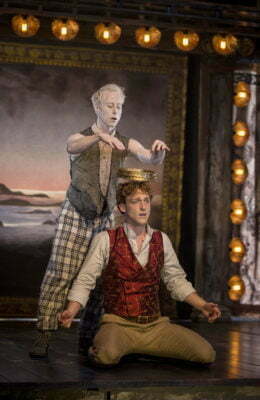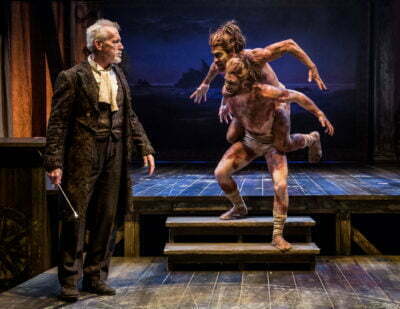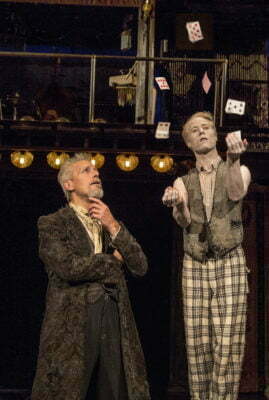The Tempest (Chicago Shakespeare)

By William Shakespeare
Directed by Aaron Posner and Teller
Produced by Chicago Shakespeare Theater
An Accessible Tempest for New and Old Fans
Chicago Shakespeare prides itself on producing world-class shows on a level that appeals as much to novices as experts. The approaching four hundredth anniversary of Shakespeare’s death and the associated commemorations provide them with further impetus for developing a new audience. Therefore, it makes sense that they would turn to Aaron Posner and Teller to direct this season’s opener, The Tempest. Posner is famous for writing Stupid Fucking Bird, a modern adaptation of Anton Chekhov’s The Seagull that humorously captured modern theatre goers’ and practitioners’ love-hate relationship with the influence old works have on their art form. Teller is famous for his stage magic with Penn Gillette, which The Tempest provides an excellent opportunity to demonstrate. Together, their brainchild has the potential to fascinate newcomers and rejuvenate those who have been overexposed to the play, but the production still depends upon Larry Yando and Nate Dendy’s performances as Prospero and Ariel to succeed.

Prospero lives on an island with his daughter, Miranda (Eva Louise Balistrieri) and two enslaved spirits: the base, earthy Caliban (Zach Eisenstat and Manelich Minniefee) and the clever, shapeshifting Ariel. Years ago, Prospero was the Duke of Milan, but as his studies into magic distracted him from governing, his brother Antonio (Lawrence Grimm) conspired against him. With his allies, Alonso, King of Naples (John Lister) and his brother Sebastian (Michael Aaron Lindner), Antonio deposed Prospero, and to make their deaths look accidental, set him and the infant Miranda adrift on a sinking ship. But Prospero’s friend Gonzala (Barbara Robertson) packed his spellbooks and magic staff with his luggage, and the father and daughter reached the island, where they’ve been trapped ever since. But now, a ship carrying the conspirators is passing by, and Prospero conjures a magical tempest to wreck it, trapping his enemies under his god-like power. He hasn’t figured out what to do with them yet.
The scenic design, by Don Conway, is reminiscent of an early twentieth century magic show. There are strings of lights, paintings of Chinese dragons along the back, a seahorse that could be a ship’s figurehead or a carousel seat, and an astrological chart painted on the floor. In a space Shakespeareans would call the “inner above,” are musicians and singers Ethan Deppe, Liz Filios, Jake Saleh, and Bethany Thomas. They mostly sing from the repertoire of Tom Waits and Kathleen Brennan, whose “Dirt in the Ground,” is repeated several times, but with accordion and bass accompaniment. They sound mystical and evocative of Prospero’s struggle to choose between vengeance and forgiveness, but replace much of Shakespeare’s language. This is quite alright in the first scene, which passes by in only a few seconds, and is focused on Ariel’s rescue of the innocent Neapolitan prince Ferdinand (Luigi Sottile), who Prospero decides to set up with his daughter.

The extent of the cuts is both the production’s greatest strength and weakness. The plot points and most famous speeches are retained, and little else is. This allows the show to move faster and focuses it more tightly on Prospero and Ariel’s relationship, but leaves much of the first act feeling like an excuse for Teller’s magic. It’s impressive stuff; there’s a sequence in which Ariel frightens Ferdinand by levitating his father’s crown, and one in which Prospero makes the young man bend in gravity-defying ways. But as long as they were making cuts, I wish they would have shortened the scene in which Caliban meets the clowns Trinculo and Stephano (Adam Wesley Brown and Ron E. Rains). Their performances are all amusing, but the scene doesn’t have much content, and retaining a disproportionate amount of fluff in Caliban’s appearances is unfortunate, because Posner and Teller have such an interesting concept for him. Eisenstat and Minniefee speak simultaneously and never separate from each other, as if they are conjoined twins with a single mind. Their movements are choreographed by the dance company Pilobolus, led by Matt Kent, and are fascinating to watch, but fixating on their bodies distracts from their mental state.
All the other actors are likewise worthy of Chicago Shakespeare’s standout reputation. Grimm is a sneering Jacobean villain, Lindner, due to line cuts, makes Sebastian much less vile than usual, and Lister is a regretful, dismayed Alonso. Chicago Shakespeare newcomers Balistrieri and Sottile are winsome youths, and making Gonzalo female allows a brief, but touching, moment at the play’s end when Miranda sees another woman for the first time. A xylophone is sounded each time somebody mentions forgiveness, and rings frequently when Gonzola speaks. This grants the character far more dignity than if she were played as doddering or in denial, and Robertson radiates warmth.

But it is Dendy and Yando’s performances which more than redeem everything wobbly about the play. Ariel’s costume and make-up designs are triumphs for Paloma Young, Rachel Laritz, and Melissa Veal. Dendy has an unearthly white glow, and wears yellow contacts. His voice is clipped, reedy, and refined, and he deftly performs card tricks throughout the night, starting during the pre-show. His Ariel admires Prospero and isn’t quite human enough to desire vengeance, but his nature is to cherish freedom. Yando first appears doubled over trying to catch his breath, exhausted from his use of magic, but perhaps also feeling conflicted. Sending Ariel out later to capture the conspirators exerts a similar toll on him. The magic in the second act, especially the harpy scene, is much more interesting, because it springs clearly from Prospero and Ariel’s goals, rather than being shoehorned in. Their character arcs provide the show’s stagecraft with emotional context, and allows Yando to fully exploit his considerable talent. Three simple words, “And mine shall,” are a choice for Prospero which conclude a magnificent journey, which any lover of theatre or magic would be delighted to go on.
Highly Recommended
Jacob Davis
This show has been Jeff recommended.
Playing at Chicago Shakespeare Theater’s Courtyard Theater, 800 East Grand Avenue, Chicago. Tickets are $48-88, with discounts for groups and patrons under 35; to order, call 312-595-5600 or visit chicagoshakes.com. Playing through November 8. Running time is two hours and twenty minutes, with one intermission.
